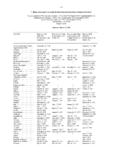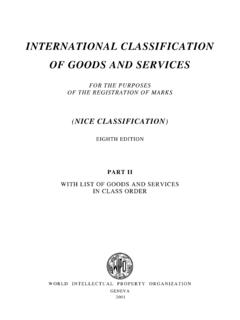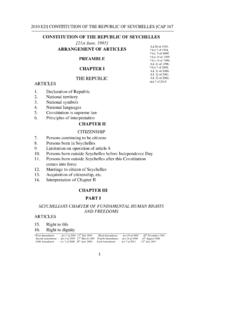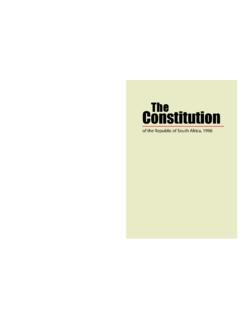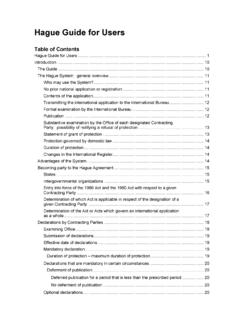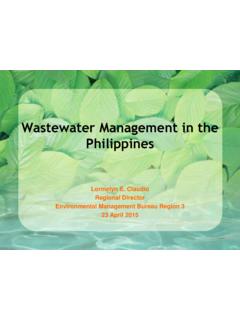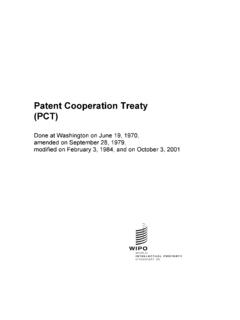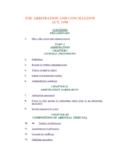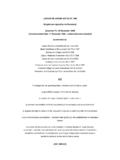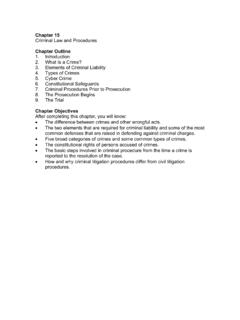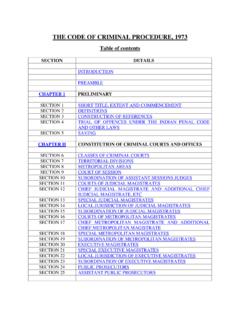Transcription of ACTS OF GHANA - WIPO
1 acts OF GHANA FIRST REPUBLIC criminal PROCEDURE CODE, 1960 (ACT 30) ARRANGEMENT OF SECTIONS Section PART I GENERAL PROVISIONS Procedure 1. Procedure for offences. 2. Mode of trial. Arrest Generally 3. Arrest, how made. 4. Search of place entered by person sought to be arrested. 5. Power to break out of any house for purpose of liberation. 6. No unnecessary restraint. 7. Notification of substance of warrant. 8. Search of arrested persons. 9. Arrested persons to be taken at once to police station. 10. Arrest by police officer without warrant. 11. Refusal to give name and residence. 12. Arrest by private persons without warrant. 13. Repeal. 14. Disposal of person arrested by private person. 15. Holding in custody of persons arrested without warrant. 16. Police to report apprehensions.
2 17. Offence committed in District Magistrate's presence. 18. Arrest by District Magistrate. Escape and Retaking 19. Recapture of person escaping. 20. Sections 4 and 5 to apply to arrests under section 19. 21. Assistance to District Magistrate or police officer. Security for keeping the peace and for good behaviour 22. Power of District Magistrate to require execution of bond for keeping the peace. 23. Security for good behaviour for suspected persons. 24. Order to be made. 25. Procedure in respect of person present in Court. 26. Summons or warrant in case of person not so present. 27. Copy of order under section 24 to accompany summons or warrant. 28. Power to dispense with personal attendance. 29. Enquiry as to truth of information. 30. Order to give security. 31. Discharge of person informed against. Proceedings in all Cases Subsequent to Order to Furnish Security 32. Commencement of period of which security is required.
3 33. Contents of bond. 34. Power to reject sureties. 35. Procedure on failure of person to give security. 36. Power to release persons imprisoned for failure to give security. 37. Power of Court to cancel bond. 38. Discharge of Sureties. Prevention and Investigation by Police 39. Police to prevent offences. 40. Information of design to commit offences. PART II PROVISIONS RELATING TO criminal PROCEEDINGS Place of Enquiry or Trial 41. General authority of Courts to bring accused persons before them. 42. Accused person to be remitted in certain cases to another Court. 43. Removal under warrant. 44. Bringing case before Higher Court or Circuit Court, etc. 45. Determination of place of investigation and trial. 46. Offences at sea or out of GHANA . 47. Offences committed on a journey. 48. Court to decide in case of doubt. 49. Cause commenced in wrong place. Information as to offences against the State 50.
4 Power to require information. 51. Saving for privileged communications. 52. Restrictions on use of information obtained. 53. Punishment for failure to give information. Control of Attorney-General over criminal Proceedings 54. Nolle prosequi. 55. Attorney-General may delegate certain powers as to nolle prosequi. Appointment of Public Prosecutors and Conduct of Prosecutions 56. Power to appoint and duties of public prosecutors. 57. Power of public prosecutor to intervene in private prosecutions. 58. Prosecutions on indictment to be brought only by Attorney-General. 59. Withdrawal from prosecution in trials and preliminary investigations before District Courts. Institution of Proceedings 60. Method of instituting criminal proceedings. 61. Making a complaint. Issue of Summons 62. Form and contents of summons. 63. Service of summons. 64. Service when person summoned cannot be found. 65. Procedure when service cannot be effected as before provided.
5 66. Service on Civil Servant. 67. Service on Company. 68. Service outside local limits of jurisdiction. 69. Proof of service when serving officer not present. 70. Power to dispense with personal attendance of accused. 71. Warrant when issued. 72. Summons disobeyed. 73. Form, contents and duration of warrant of arrest. 74. Court may direct security to be taken. 75. Warrants to whom directed. 76. Execution of warrant directed to police officer. 77. Person arrested to be brought before the Court without delay. 78. Where warrant of arrest may be executed. 79. Forwarding of warrants for execution outside jurisdiction. 80. Procedure in case of warrant directed to police officer for execution outside jurisdiction. 81. Procedure on arrest of person outside jurisdiction. Miscellaneous Provisions Regarding Processes 82. Summons, warrants, etc., on Sunday. 83. Irregularities in processes. 84. Power to take bond for appearance.
6 85. Arrest on breach of bond for appearance. 86. Power of Court to order prisoner to be brought before it. 87. Provisions of this part generally applicable to summonses and warrants. Search Warrants 88. When search warrant may be issued and proceedings thereunder. 89. Time when search warrant may be executed. 90. Persons in charge of closed place to allow ingress. 91. Detention of articles seized. 92. Provisions applicable to search warrants. 93. Search without a warrant in certain cases when articles are being conveyed, etc. 94. Search of premises without warrant. 95. Saving with respect to certain postal matter. Provisions as to Bail and Recognizances Generally 96. Granting of bail. 97. General provisions as to recognizances. 98. Discharge from custody. 99. Deposit instead of recognizance. 100. Variation of a recognizance. 101. Discharge of sureties. 102. Recognizances in respect of minors. 103.
7 Persons bound by recognizance absconding may be committed. 104. Forfeiture of recognizance. 105. Appeal from and review of orders. 106. Order of fresh security upon original order. 107. Power to direct levy of amount due on certain recognizances. 108. Photographs and finger prints. Joinder of Charges and Accused 109. Joinder of charges. 110. Joinder of accused. 111. Separate trial if accused likely to be prejudiced by joinder. 112. Statement of charges in necessary documents. Previous Acquittal or Conviction 113. Retrial. 114. Retrial on separate charge. 115. Consequences supervening or not known at time of former trial. 116. Where original Court was not competent to try subsequent charge. 117. Proof of previous conviction or acquittal. Offences by Aliens within Territorial Waters. 118. Trial of aliens for offences committed in territorial waters. Examination of Witnesses 119. Repeals. 120. Evidence to be given on oath.
8 121. Certain scientific reports to be evidence in all Courts. 122. Documents or copies to be evidence. 123. Repeal. Commissions for the Examination of Witnesses 124. Issue of commission for examination of witnesses. 125. Power of Magistrate to apply for issue of commission. 126. Parties may examine witnesses. 127. Return of commission. 128. Adjournment of enquiry or trial. Evidence for Defence 129. Evidence of witnesses. 130. Repeal. 131. Alibi. 132. Right of Reply Lunacy of Accused and Defence of Lunacy 133. Enquiry by Court as to lunacy of accused. 134. Procedure when certified as capable of making his defence. 135. Resumption of proceedings. 136. Defence of lunacy at preliminary proceedings. 137. Defence of lunacy on trial on indictment. 138. Procedure when accused does not understand proceedings. Costs and Compensation 139. Costs against accused and against private prosecutor. 140. Order to pay costs appealable.
9 141. Compensation in case of frivolous or vexatious charge. 142. Costs and compensation to be specified in order, how recoverable. 143. Power of Court to award expenses or compensation out of fine. Disposal and Restitution of Articles and Property 144. Power of Court to order destruction, etc., of articles. 145. Restitution of property found on person arrested. 146. Restitution of property stolen. 147. Restriction on disposal of property of accused person. 147A. Payments of money made by accused persons. 147B. Order for recovery of property or its value. 147C. Definition of an offence involving dishonesty. 148. Power to order offender to make compensation. 149. Effect of payment of compensation. 150. Power of District Magistrate to make orders as to property in possession of police. 151. Regulations relating to unclaimed property in possession of police. Summary Procedure in Perjury 152. Perjury.
10 Conviction for Offence other than Charged 153. Person accused of any offence may be convicted of attempt. 154. When offence proved is included in offence charged. 155. Conviction of extortion on charge of corruption and vice versa. 156. Conviction of receiving on charge of stealing. 157. Conviction of false pretences on charge of stealing and vice versa. 158. Conviction of extortion on charge of robbery and vice versa. 159. Person charged with rape or defilement may be convicted of kindred offence. 160. Conviction of treason-felony or charge of treason. 161. Conviction of motoring offence on charge of manslaughter. 162. Conviction on other charges pending. PART III SUMMARY TRIAL 163. Summary trial. 164. Application. Procedure upon Summary Trial 165. Publicity. 166. Non-appearance of prosecutor. 167. Non-appearance of accused. 168. Appearance of both parties. 169. Adjournment. 170. Non-appearance of parties after adjournment.
